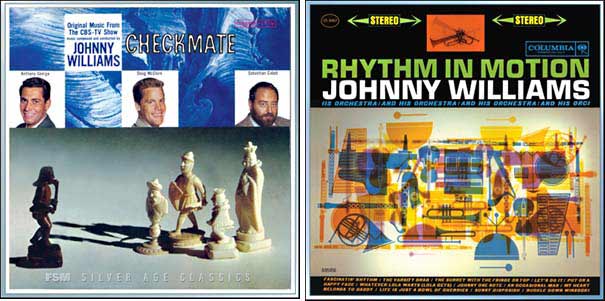************************************************************** EDITOR'S RECOMMENDATION December 2006 **************************************************************
Checkmate / Rhythm in Motion
Music composed, produced, orchestrated and conducted by Johnny Williams / Various
Performed by session big band / ‘His Orchestra’
Album produced by Lukas Kendall
Available on Film Score Monthly (FSM Vol 9 No. 8)
Running Time: 68:50

42 years before he scored Minority Report the young John Williams (here billed as Johnny Williams) provided the music for Checkmate, a TV series about a San Francisco detective agency which attempted to prevent crimes before they could happen. A shame the detectives couldn’t have foreseen the crime against cinema Minority Report would be and prevent it being made. Just as Williams was the only one to walk away with credit from Minority Report, so his music remains the lasting legacy of an otherwise forgotten TV show. Where the composer’s music for Minority Report was monochromatic orchestral, his contribution to Checkmate followed the fashion of the time in adopting a jazz sound for the detective milieu.
The excellent booklet notes by Jeff Eldridge explain how Williams had already played piano on Henry Mancini’s popular Peter Gunn albums, spun off from the detective series of the same name, composed for M Squad, and even appeared in the pilot of jazz detective show Staccato. Williams was thus a natural for the gig, and while he had contributed to numerous different series, Checkmate was the first TV show for which he was given overall musical responsibility. It was his job to provide the theme and scores for all 36 episodes of the first season – he only scored four episodes during the second, final season, having moved on to the dramatic anthology series Alcoa Premiere.
Apart from a big band sound for the main title theme the bulk of the episode scores were reportedly low key and atmospheric, scored for a small ensemble and offering little in the way of melody. However, around the same time Williams began work on Checkmate he also signed a recording contract with Columbia – he had made several LPs for budget labels. So it was that Checkmate came to form the basis of John Williams’ first major label album as the featured artist. The idea was for a popular album, not a soundtrack aficionados disc, and Williams found five pieces he had composed for the episodes up to December 1960, then wrote six more to fill out the album. Together with an arrangement of the title theme this became the LP, scored for a standard big band line-up augmented by three French horns.
Through this set of generally downbeat or low key late night introspective jazz based numbers the listener is very unlikely to recognise the composer as the John Williams of the blockbuster movie era from Jaws onwards, though anyone with a fondness of cinema jazz of from the 1950’s / early 60’s should be right at home. The result is much more musically cohesive and enjoyable as an album than various of quirky pop-jazz 60’s Williams film soundtracks released by FSM – yes John Goldfarb, we might be talking about you…
The opening ‘Theme from Checkmate’ is dramatic and catchy, and could have fitted right into Mission: Impossible. It leads into a set of tunes many of which wouldn’t be out of place on a Mancini disc. ‘Fireside Eyes’ and ‘Queen’s Sacrifice’ have the sort of cocktail lounge sound familiar from many a Pink Panther album. Even so, Williams inserts an extra sparkle and hint of mournfulness to the later track which elevates it far above the norm. ‘Shy Youth’ meanwhile has a fairytale quality, the gentle melody on flute and French horn sent against glockenspiel. ‘En Passant’ is a darker cue built around similar thematic material, while ‘The Black Night’ delivers a rousing brass arrangement to put a smile on the face. And that’s just a selection from the first half of this CD.
Next up is Rhythm in Motion, Williams’ follow-up disc for Columbia and a platter designed as a state-of-the-art stereo showcase filled with Broadway tunes from the 1920’s and ’30s. The disc featured top Hollywood session players, including Williams’ own brother, Jerry, and father, Johnny Sr. The booklet notes put it perfectly, “Williams’ charts combine smoking big band writing with soaring horn countermelodies, helter-skelter woodwind passages and inventive use of percussion.” The result is large scale, rousing, exhilarating and a whole lot of fun. It is a much more upbeat set than Checkmate, and so compliments it perfectly. The original LP notes by Jim Harbert described it as “a happy album designed for stereo”, and so it is. Here is joyful music making, all displayed in a still spectacular sounding stereo showcase with “trumpets and trombones to the right of you, woodwinds, horns and harp to the left of you, and percussionists prevailing all over the place.” Yet it is not a gimmick album, as so many early stereo LPs were. Williams was always too tasteful a musician for that, and the music always comes first. From ‘Fascinatin’ Rhythm’ though now forgotten tunes such as ‘Buckle Down Winsocki’ what is on offer is sheer exuberant delight in having these fine musicians let rip.
We don’t tend to think of John Williams music as having too much youthful bounce in it these days, so take a trip back to before he became a ‘serious’ film composer and have a blast. This is the most fun ‘new’ John Williams album in quite a while. If you are any sort of fan of the composer you owe it to yourself to go back to what is pretty much the beginning of his album career and listen to how it all began. Sound, production and presentation are all first rate.
Gary Dalkin
Rating:
4.5
Film Score Monthly press release available here: http://www.screenarchives.com/title_detail.cfm?ID=5668
Return to Reviews Index